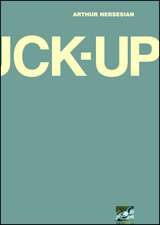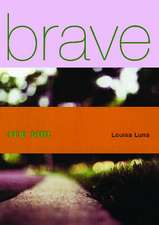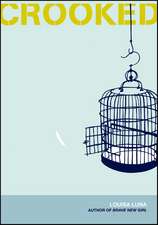Floating
Autor Robin Troyen Limba Engleză Paperback – 18 feb 2002
Preț: 100.93 lei
Nou
Puncte Express: 151
Preț estimativ în valută:
19.32€ • 20.09$ • 15.95£
19.32€ • 20.09$ • 15.95£
Carte disponibilă
Livrare economică 22 martie-05 aprilie
Preluare comenzi: 021 569.72.76
Specificații
ISBN-13: 9780671024499
ISBN-10: 0671024493
Pagini: 272
Dimensiuni: 127 x 178 x 20 mm
Greutate: 0.22 kg
Ediția:Original
Editura: MTV Books
Colecția MTV Books
ISBN-10: 0671024493
Pagini: 272
Dimensiuni: 127 x 178 x 20 mm
Greutate: 0.22 kg
Ediția:Original
Editura: MTV Books
Colecția MTV Books
Notă biografică
Robin Troy grew up in Connecticut and graduated from Harvard University in 1996. She currently lives in Denver and is working on her second book.
Extras
Chapter One
There is only one road leading out of Whitticker, Arizona, and Ruby Robert Black Pearson was walking down it -- past the sign that reads "Population: 641," toward the rest of the world -- the afternoon her husband held up the 7-Eleven at the edge of the freeway with an unloaded pistol. The mechanics at the service station next to the 7-Eleven had kept Ruby's truck jacked up toward the ceiling for the past six days, and Ruby was tired of walking. In high school alone she had walked this three-mile stretch of road out of Whitticker more times than she could remember, promising herself each time that she would keep on going, anywhere but back. But now, years later, with a child and a husband and the resignation that she was destined to grow old in the only town she'd ever known, Ruby would just as soon have had a car, any car, to whisk her out to the edge of the freeway and back before the truth hit her, yet again, that at the end of the road she was turning around. She'd had enough of walking.
Ruby walked to the service station that afternoon like a large, lumbering animal whose long, powerful strides appear languorous and slow until you need to outrun them. The crunching of her old boots in the packed-dirt shoulder could have been the clopping of a horse to any tourist passing with his eyes closed. And Ruby would not have disputed the comparison. It was true that everyone in Whitticker was fascinated by her hugeness, her six feet and two inches, her wide hips that, like the flanks of a young horse at a run, were strong and sensual and sometimes hypnotic, not fat. She was tall enough to keep any man sitting while in her presence, but however domineering she might be, no man seated near her wouldn't rather have been sweeping her off her feet. There had never been anyone, in Whitticker, like Ruby.
She talked out loud to herself as she marched deliberately along the shoulder, throwing declarations to the sage and the cacti that all of them were drunks, good-for-nothings, lumps of burden and laziness that she didn't care if she never saw again. She tossed to the brittle clusters the highlights of a conversation she planned to have later with her husband, Carl, and as she spat down to her mute desert audience that they were bums, spineless cowards, boring, worthless, childish, skinny little boys who couldn't put their feet down for themselves or their family if it meant saving their own lives, years of disdain rose from deep within her to the prickles rising on her skin. It was an exercise that energized her -- not that she needed the rehearsal. For one thing, if Carl was half as drunk as he had been last night when she knocked him off their front porch -- threatening to bring the empty bottle down hard on his head if he didn't get out of her sight until he could muster some semblance of a man again -- he wouldn't realize he was the center of so much attention before he was face down in the dirt for the second night in a row. And even if he wasn't drunk -- if he was just there on the porch with their dog Max and a wad of chew -- it would scarcely matter how she chose her words, because Carl rarely responded anyway.
So it was simply to pass the time that Ruby practiced as she walked. The road was flat and straight, the only rise and fall coming from the jagged cadence of Ruby's voice. The 7-Eleven and the service station ahead of Ruby scarred the landscape with their slick red roofs and neon signs. She had often wished that these two buildings and their concrete platforms were better dwarfed by the high mountains beyond them, so that they might appear as inconsequential in thesprawling desert as the individual cars that threaded themselves, like colored beads along a string, down the single road out of Whitticker to this glaring, commercial plot. At least the zoning laws had protected the town from any more of that kind of building, Ruby thought to herself. At least Whitticker had that much going for it. Even if there were posts you shouldn't lean against and steps it would be better to step over, the wooden storefronts along the main street downtown had a charm that the locals no longer really saw but still took pride in, that the tourists -- and there was always a stream of tourists -- snapped eagerly with their cameras so they could remember the place where they had swigged beer from a bottle next to a real cowboy, albeit one they'd be relieved to leave behind.
Ruby and Carl used to talk about the day when they might leave. In retrospect, Ruby thought their shared enthusiasm for planning ways out of Whitticker as teenagers had probably brought them together in the first place. Or maybe it was just the conviction they shared that if they wanted to leave, they could. Ruby didn't dislike Whitticker; twenty-five years later -- years after her mother and stepfather had given up on the town themselves and left -- Ruby could still recognize the character in the listing buildings, and her own shining place among them. But what bothered her was that within those buildings no one seemed to question what lay beyond the three-mile stretch of road where their small town spilled into the rest of the world.
Carl, on the other hand, had shown some curiosity. He had moved to town with his mother when he was ten, the new fifth grader from out of state. At Eagle Watch Elementary, he was the only friend Ruby had who could talk about the house where he used to live, the craggy passes where he used to ride his horse, the back alleys in his old town where he used to sit on overturned milk crates smoking cigarettes sneaked from his father's pants pocket. Carl had seen where the highway led -- if only from a few states away -- and his curiosity, unlike Ruby's, stemmed from the places he had seen, rather than the places he had not.
In high school, Carl worked pumping gas four afternoons a week at the station in town. Between customers, he chose maps from the rack by the register and spread them out one at a time over the counter, taking in the names of towns from California to Maine, running his finger along winding routes, counting miles by his thumbnail. For Ruby's seventeenth birthday, he wrapped a map of the United States in flowered paper and gave it to her with a card. She took one look at the map's yellowed edges and threw it back at him. She wasn't interested in a freebie Carl could help himself to just because no one else had wanted it. But Carl had picked up the map and unfolded it for her, revealing a maze of red routes he had carefully drawn in, each of them punctuated by gold star stickers showing where he would take Ruby someday. "I want to see all of this with you," the card was inscribed in the same red pen.
But it wasn't the promises that had drawn Ruby to Carl so much as the energy he put into his planning. The fact that his energy was complemented by sharp cheekbones, deep-set eyes, and confidence didn't slow her attraction to him, either. However, there was something else that drew Ruby to Carl. It was what had kept them together for years, but now, more than likely, was also driving them apart. Ruby could see how people in Whitticker looked at her, how they admired her bright presence in their town. But only from Carl could she hear it. Only Carl was close enough to tell her how he felt. And Carl felt that Ruby could do anything in the world that she wanted. He told her so repeatedly, and she loved him for it. For while it was one thing for Ruby to believe she was strong and capable, it was something entirely different to be told.
The snag, though, was that Carl had grown resentful over time. In the same years Ruby matured into a young woman who believed she was invincible, Carl became more and more dependent on his identity as her other half. While he always pictured them together in the stories he spun about the future, Ruby was quicker to take his confidence in her potential and run with that alone. After high school, Carl went to work in the Western Wear Outfitters' boot department, where he gradually lost his teenage determinations amidst the size and shape of other people's footsteps. But Ruby he was determined not to lose. She gave definition to his life in Whitticker, even if he did resent the freedom she had -- a freedom he had in part built in her himself -- to do so. She gave him a stake in the town he seemed less and less likely to leave. And so it seemed ridiculous now, as she yelled to the cacti along the road almost a decade later, that Ruby could ever have hailed Carl for his ingenuity and direction.
The back of Ruby's shirt clung to her skin with perspiration generated as much from cursing the vegetation as from walking the three-mile stretch in the suffocating heat. By the time she reached the service station, where she could see the truck was ready for her, she was ready for trouble. She wanted to give someone hell. But even though cars were parked by the repair shop and in front of the 7-Eleven, there wasn't a person anywhere in sight. How strange, Ruby thought. Not only was no one working the gas pump or coming with a drink or a coffee cake through the door of the 7-Eleven, but there was no sound of anyone at all. Ruby's boots on the asphalt made the only noise she could hear. Too aware of herself for her own comfort, she paused just short of her truck. The driver's door was open.
"Hello?" she called to the buildings, the cars, the spaces around them. Her voice broke into the air like a mistake, like something dropped by accident with a bang. "Hello, hello, hello," she called again, with no response.
There was a shuffle behind one of the cars. A small boy poked his face around a wheel, his eyes red and wet with tears. He clung to the tire as if to the leg of a parent, and his shoulders shivered, although in Whitticker, Arizona, in the middle of July, he could hardly have been cold.
Ruby crouched down so as not to scare him away. "Hey," she whispered, inching toward him as she would to extend a crumb of bread to a wild animal. "Hey, little man, tell me what's going on." Ruby had never been one for patience, but she had learned some with her son, Brian, over the past eight years.
The boy opened his mouth to speak, but could only sniffle and heave. "You're okay," Ruby reassured him insistently, until she was almost close enough to wipe his streaky cheeks. He flinched, snot appearing and disappearing in his nostrils each time he breathed, then pulled away again. Ruby backed up as well, though she wanted badly to yank him from behind the tire and shake out the answer to what the hell was going on. All she knew was that the cars hadn't driven there themselves. But there was no evidence of any person for miles who wasn't crouched down hiding, holding his breath.
"Listen," she said, trying to keep a soothing tone. "You're okay. Everything's fine." She wiped her upper lip, aware that she wasn't even convincing herself. "You tell me where your mom went. Did she leave you out here? I bet she told you to wait for her right here. You tell me, did she go in there?"
Ruby pointed to the door of the 7-Eleven just as it flew open, and Carl, pistol waving, pockets bulging, burst outside, red-faced and raging. The glass pane blew out of its frame behind him and shattered in midair from his force, hitting the concrete with shrill, dangerous cracks. Before Ruby could grab hold of the boy, he let loose a piercing scream in pitch with the breaking glass and buried his face as best he could in the hubcap. Ruby watched in disbelief -- amazement, really -- as Carl stormed toward the open door of her truck, howling like a madman, stumbling like a drunk. In one fluid motion, he leapt into the driver's seat and gunned the engine to a roar, taking hold of the steering wheel as he would the collar of a man he intended to slam up against a wall and bloody. He pitched his body forward as he leaned on the gas, his face inches from the windshield. The tires shrieked against the concrete, dirt spat up from beneath the truck, and an empty bottle Carl threw out the window landed with a crack that echoed the door shattering, the little boy screeching, and Ruby herself screaming and screaming the very condemnations -- Bastard, Moron, Son-of-a-Bitch, Bum -- that she had practiced on the cacti and the sage all the way out to the end of the road. And Carl -- the Loser, Thief, Good-for-Nothing, Pockmarked Six-Toed Lowlife -- even had the nerve, Ruby screamed before she collapsed on the pavement, to take off down the road that left Whitticker behind without her. Not more than forty-five seconds, and her world was upside-down. The husband she had left in bed snoring that morning was burning rubber to who knows where. With who knows how much money. With who knows what lunatic train of thought driving him along. Forty-five seconds and he'd disappeared with everything she might ever have had: easy money, a smooth truck, the fundamental components of a family. Sprawled on her belly on the hot concrete, Ruby didn't know which part angered her the most. She didn't know which part, if any, she hadn't expected.
But one thing she knew for sure, there was no way in hell she was walking all the way back home. She picked herself up and headed back toward the 7-Eleven, hardly considering that if there had been a holdup, there must be people stillinside. What she was thinking as she stormed across the lot was that she hated her husband, that she hated herself for not leaving first, that, for a second, she even hated her son, who would grow up with his father's features, Carl's nose and Carl's chin. At that moment, she hated every person in her lousy life who had been even indirectly involved in bringing her to this afternoon, this colossal letting-down. If being deserted could be spoken of so mildly. She would have sworn out loud right then never to attach herself to another person for the rest of her life if it could have kept her from feeling this combination of anger and embarrassment ever again. But as she opened the paneless door of the 7-Eleven, the assemblage she found there stole her breath away, and despite her earlier verbosity with the sage and the cacti, she could not find the voice to say one word.
Growing up, Ruby had seen plenty of fights in bars and rodeos and against school lockers, plenty of broken bodies waiting to be hauled off in ambulances, but that hadn't prepared her for what she saw here: a floor, a dirty, gritty floor, strewn with bodies, close to a dozen, on their stomachs in front of her. All of them lying there, not dead, but looking it. She couldn't hear any of them breathing. On the wall behind the register, the clock read quarter past three. On the counter, a cup of coffee stood with an open creamer beside it. Steam swirled up from the coffee. Ruby could hear the clock's dull, steady tick; without it, she might have believed this scene had been suspended in time. She couldn't tell if the people on the floor knew she was there, if they knew she was Ruby, not Carl. What she could see, once she looked closer, was the slightest rise and fall in their shoulders, indicating that each individual was doing just enough to stay alive. It reminded her, yes, keep breathing.
Counting them fast, she knew what struck her as strangest. There were nine people, all but three of them men, stretched out facedown, scattered like pieces of an odd jigsaw puzzle, in place but not interlocking. In the cramped space, despite the pandemonium in which they must have hit the ground, these nine bodies lay untouching. If their outlines were drawn on the floor, there would be nine figures whose lines did not intersect. Practically impossible, Ruby thought. Frightening, that in the face of one stumbling drunk with a gun, nine people didn't come together to take his weapon, force him to the ground. Strange, that minutes after he had left they remained fixed to the floor. Ruby stared down at them as if she couldn't be seeing correctly. She felt her knees go weak and her throat go dry. It was hot, too hot, in the store. Pull yourself together, Ruby said to herself without moving her lips. "Get up," she rasped to the group of them as her own body dropped heavily to the ground.
Copyright © 1998 by Robin Troy
There is only one road leading out of Whitticker, Arizona, and Ruby Robert Black Pearson was walking down it -- past the sign that reads "Population: 641," toward the rest of the world -- the afternoon her husband held up the 7-Eleven at the edge of the freeway with an unloaded pistol. The mechanics at the service station next to the 7-Eleven had kept Ruby's truck jacked up toward the ceiling for the past six days, and Ruby was tired of walking. In high school alone she had walked this three-mile stretch of road out of Whitticker more times than she could remember, promising herself each time that she would keep on going, anywhere but back. But now, years later, with a child and a husband and the resignation that she was destined to grow old in the only town she'd ever known, Ruby would just as soon have had a car, any car, to whisk her out to the edge of the freeway and back before the truth hit her, yet again, that at the end of the road she was turning around. She'd had enough of walking.
Ruby walked to the service station that afternoon like a large, lumbering animal whose long, powerful strides appear languorous and slow until you need to outrun them. The crunching of her old boots in the packed-dirt shoulder could have been the clopping of a horse to any tourist passing with his eyes closed. And Ruby would not have disputed the comparison. It was true that everyone in Whitticker was fascinated by her hugeness, her six feet and two inches, her wide hips that, like the flanks of a young horse at a run, were strong and sensual and sometimes hypnotic, not fat. She was tall enough to keep any man sitting while in her presence, but however domineering she might be, no man seated near her wouldn't rather have been sweeping her off her feet. There had never been anyone, in Whitticker, like Ruby.
She talked out loud to herself as she marched deliberately along the shoulder, throwing declarations to the sage and the cacti that all of them were drunks, good-for-nothings, lumps of burden and laziness that she didn't care if she never saw again. She tossed to the brittle clusters the highlights of a conversation she planned to have later with her husband, Carl, and as she spat down to her mute desert audience that they were bums, spineless cowards, boring, worthless, childish, skinny little boys who couldn't put their feet down for themselves or their family if it meant saving their own lives, years of disdain rose from deep within her to the prickles rising on her skin. It was an exercise that energized her -- not that she needed the rehearsal. For one thing, if Carl was half as drunk as he had been last night when she knocked him off their front porch -- threatening to bring the empty bottle down hard on his head if he didn't get out of her sight until he could muster some semblance of a man again -- he wouldn't realize he was the center of so much attention before he was face down in the dirt for the second night in a row. And even if he wasn't drunk -- if he was just there on the porch with their dog Max and a wad of chew -- it would scarcely matter how she chose her words, because Carl rarely responded anyway.
So it was simply to pass the time that Ruby practiced as she walked. The road was flat and straight, the only rise and fall coming from the jagged cadence of Ruby's voice. The 7-Eleven and the service station ahead of Ruby scarred the landscape with their slick red roofs and neon signs. She had often wished that these two buildings and their concrete platforms were better dwarfed by the high mountains beyond them, so that they might appear as inconsequential in thesprawling desert as the individual cars that threaded themselves, like colored beads along a string, down the single road out of Whitticker to this glaring, commercial plot. At least the zoning laws had protected the town from any more of that kind of building, Ruby thought to herself. At least Whitticker had that much going for it. Even if there were posts you shouldn't lean against and steps it would be better to step over, the wooden storefronts along the main street downtown had a charm that the locals no longer really saw but still took pride in, that the tourists -- and there was always a stream of tourists -- snapped eagerly with their cameras so they could remember the place where they had swigged beer from a bottle next to a real cowboy, albeit one they'd be relieved to leave behind.
Ruby and Carl used to talk about the day when they might leave. In retrospect, Ruby thought their shared enthusiasm for planning ways out of Whitticker as teenagers had probably brought them together in the first place. Or maybe it was just the conviction they shared that if they wanted to leave, they could. Ruby didn't dislike Whitticker; twenty-five years later -- years after her mother and stepfather had given up on the town themselves and left -- Ruby could still recognize the character in the listing buildings, and her own shining place among them. But what bothered her was that within those buildings no one seemed to question what lay beyond the three-mile stretch of road where their small town spilled into the rest of the world.
Carl, on the other hand, had shown some curiosity. He had moved to town with his mother when he was ten, the new fifth grader from out of state. At Eagle Watch Elementary, he was the only friend Ruby had who could talk about the house where he used to live, the craggy passes where he used to ride his horse, the back alleys in his old town where he used to sit on overturned milk crates smoking cigarettes sneaked from his father's pants pocket. Carl had seen where the highway led -- if only from a few states away -- and his curiosity, unlike Ruby's, stemmed from the places he had seen, rather than the places he had not.
In high school, Carl worked pumping gas four afternoons a week at the station in town. Between customers, he chose maps from the rack by the register and spread them out one at a time over the counter, taking in the names of towns from California to Maine, running his finger along winding routes, counting miles by his thumbnail. For Ruby's seventeenth birthday, he wrapped a map of the United States in flowered paper and gave it to her with a card. She took one look at the map's yellowed edges and threw it back at him. She wasn't interested in a freebie Carl could help himself to just because no one else had wanted it. But Carl had picked up the map and unfolded it for her, revealing a maze of red routes he had carefully drawn in, each of them punctuated by gold star stickers showing where he would take Ruby someday. "I want to see all of this with you," the card was inscribed in the same red pen.
But it wasn't the promises that had drawn Ruby to Carl so much as the energy he put into his planning. The fact that his energy was complemented by sharp cheekbones, deep-set eyes, and confidence didn't slow her attraction to him, either. However, there was something else that drew Ruby to Carl. It was what had kept them together for years, but now, more than likely, was also driving them apart. Ruby could see how people in Whitticker looked at her, how they admired her bright presence in their town. But only from Carl could she hear it. Only Carl was close enough to tell her how he felt. And Carl felt that Ruby could do anything in the world that she wanted. He told her so repeatedly, and she loved him for it. For while it was one thing for Ruby to believe she was strong and capable, it was something entirely different to be told.
The snag, though, was that Carl had grown resentful over time. In the same years Ruby matured into a young woman who believed she was invincible, Carl became more and more dependent on his identity as her other half. While he always pictured them together in the stories he spun about the future, Ruby was quicker to take his confidence in her potential and run with that alone. After high school, Carl went to work in the Western Wear Outfitters' boot department, where he gradually lost his teenage determinations amidst the size and shape of other people's footsteps. But Ruby he was determined not to lose. She gave definition to his life in Whitticker, even if he did resent the freedom she had -- a freedom he had in part built in her himself -- to do so. She gave him a stake in the town he seemed less and less likely to leave. And so it seemed ridiculous now, as she yelled to the cacti along the road almost a decade later, that Ruby could ever have hailed Carl for his ingenuity and direction.
The back of Ruby's shirt clung to her skin with perspiration generated as much from cursing the vegetation as from walking the three-mile stretch in the suffocating heat. By the time she reached the service station, where she could see the truck was ready for her, she was ready for trouble. She wanted to give someone hell. But even though cars were parked by the repair shop and in front of the 7-Eleven, there wasn't a person anywhere in sight. How strange, Ruby thought. Not only was no one working the gas pump or coming with a drink or a coffee cake through the door of the 7-Eleven, but there was no sound of anyone at all. Ruby's boots on the asphalt made the only noise she could hear. Too aware of herself for her own comfort, she paused just short of her truck. The driver's door was open.
"Hello?" she called to the buildings, the cars, the spaces around them. Her voice broke into the air like a mistake, like something dropped by accident with a bang. "Hello, hello, hello," she called again, with no response.
There was a shuffle behind one of the cars. A small boy poked his face around a wheel, his eyes red and wet with tears. He clung to the tire as if to the leg of a parent, and his shoulders shivered, although in Whitticker, Arizona, in the middle of July, he could hardly have been cold.
Ruby crouched down so as not to scare him away. "Hey," she whispered, inching toward him as she would to extend a crumb of bread to a wild animal. "Hey, little man, tell me what's going on." Ruby had never been one for patience, but she had learned some with her son, Brian, over the past eight years.
The boy opened his mouth to speak, but could only sniffle and heave. "You're okay," Ruby reassured him insistently, until she was almost close enough to wipe his streaky cheeks. He flinched, snot appearing and disappearing in his nostrils each time he breathed, then pulled away again. Ruby backed up as well, though she wanted badly to yank him from behind the tire and shake out the answer to what the hell was going on. All she knew was that the cars hadn't driven there themselves. But there was no evidence of any person for miles who wasn't crouched down hiding, holding his breath.
"Listen," she said, trying to keep a soothing tone. "You're okay. Everything's fine." She wiped her upper lip, aware that she wasn't even convincing herself. "You tell me where your mom went. Did she leave you out here? I bet she told you to wait for her right here. You tell me, did she go in there?"
Ruby pointed to the door of the 7-Eleven just as it flew open, and Carl, pistol waving, pockets bulging, burst outside, red-faced and raging. The glass pane blew out of its frame behind him and shattered in midair from his force, hitting the concrete with shrill, dangerous cracks. Before Ruby could grab hold of the boy, he let loose a piercing scream in pitch with the breaking glass and buried his face as best he could in the hubcap. Ruby watched in disbelief -- amazement, really -- as Carl stormed toward the open door of her truck, howling like a madman, stumbling like a drunk. In one fluid motion, he leapt into the driver's seat and gunned the engine to a roar, taking hold of the steering wheel as he would the collar of a man he intended to slam up against a wall and bloody. He pitched his body forward as he leaned on the gas, his face inches from the windshield. The tires shrieked against the concrete, dirt spat up from beneath the truck, and an empty bottle Carl threw out the window landed with a crack that echoed the door shattering, the little boy screeching, and Ruby herself screaming and screaming the very condemnations -- Bastard, Moron, Son-of-a-Bitch, Bum -- that she had practiced on the cacti and the sage all the way out to the end of the road. And Carl -- the Loser, Thief, Good-for-Nothing, Pockmarked Six-Toed Lowlife -- even had the nerve, Ruby screamed before she collapsed on the pavement, to take off down the road that left Whitticker behind without her. Not more than forty-five seconds, and her world was upside-down. The husband she had left in bed snoring that morning was burning rubber to who knows where. With who knows how much money. With who knows what lunatic train of thought driving him along. Forty-five seconds and he'd disappeared with everything she might ever have had: easy money, a smooth truck, the fundamental components of a family. Sprawled on her belly on the hot concrete, Ruby didn't know which part angered her the most. She didn't know which part, if any, she hadn't expected.
But one thing she knew for sure, there was no way in hell she was walking all the way back home. She picked herself up and headed back toward the 7-Eleven, hardly considering that if there had been a holdup, there must be people stillinside. What she was thinking as she stormed across the lot was that she hated her husband, that she hated herself for not leaving first, that, for a second, she even hated her son, who would grow up with his father's features, Carl's nose and Carl's chin. At that moment, she hated every person in her lousy life who had been even indirectly involved in bringing her to this afternoon, this colossal letting-down. If being deserted could be spoken of so mildly. She would have sworn out loud right then never to attach herself to another person for the rest of her life if it could have kept her from feeling this combination of anger and embarrassment ever again. But as she opened the paneless door of the 7-Eleven, the assemblage she found there stole her breath away, and despite her earlier verbosity with the sage and the cacti, she could not find the voice to say one word.
Growing up, Ruby had seen plenty of fights in bars and rodeos and against school lockers, plenty of broken bodies waiting to be hauled off in ambulances, but that hadn't prepared her for what she saw here: a floor, a dirty, gritty floor, strewn with bodies, close to a dozen, on their stomachs in front of her. All of them lying there, not dead, but looking it. She couldn't hear any of them breathing. On the wall behind the register, the clock read quarter past three. On the counter, a cup of coffee stood with an open creamer beside it. Steam swirled up from the coffee. Ruby could hear the clock's dull, steady tick; without it, she might have believed this scene had been suspended in time. She couldn't tell if the people on the floor knew she was there, if they knew she was Ruby, not Carl. What she could see, once she looked closer, was the slightest rise and fall in their shoulders, indicating that each individual was doing just enough to stay alive. It reminded her, yes, keep breathing.
Counting them fast, she knew what struck her as strangest. There were nine people, all but three of them men, stretched out facedown, scattered like pieces of an odd jigsaw puzzle, in place but not interlocking. In the cramped space, despite the pandemonium in which they must have hit the ground, these nine bodies lay untouching. If their outlines were drawn on the floor, there would be nine figures whose lines did not intersect. Practically impossible, Ruby thought. Frightening, that in the face of one stumbling drunk with a gun, nine people didn't come together to take his weapon, force him to the ground. Strange, that minutes after he had left they remained fixed to the floor. Ruby stared down at them as if she couldn't be seeing correctly. She felt her knees go weak and her throat go dry. It was hot, too hot, in the store. Pull yourself together, Ruby said to herself without moving her lips. "Get up," she rasped to the group of them as her own body dropped heavily to the ground.
Copyright © 1998 by Robin Troy
Recenzii
Dale Peck author of Now It's Time to Say Good-bye Robin Troy writes like a bloodhound on the trail of that most elusive of literary quarries: the truth. Superbly written and, more importantly, superbly imagined, this novel is suffused with an emotional wisdom that belies its author's age. Despite the ethereality of its title, Floating is solid as a rock.
Suzanne Strempek Shea author of Hoopi Shoopi Donna I want my MTV -- and another book by Robin Troy! Her writing is as spare and hot as the desert that surrounds Ruby and the other gems who populate this enviable debut.
Natalie Kusz author of Road Song The spark and deft phrasing that mark a true writer's voice are here in abundance. Robin Troy is the real article.
Larry Watson author of White Crosses In Floating, Robin Troy looks at many kinds of love -- maternal, fraternal, erotic -- and shows us how tangled and knotted the relationships within one small family can be.
Suzanne Strempek Shea author of Hoopi Shoopi Donna I want my MTV -- and another book by Robin Troy! Her writing is as spare and hot as the desert that surrounds Ruby and the other gems who populate this enviable debut.
Natalie Kusz author of Road Song The spark and deft phrasing that mark a true writer's voice are here in abundance. Robin Troy is the real article.
Larry Watson author of White Crosses In Floating, Robin Troy looks at many kinds of love -- maternal, fraternal, erotic -- and shows us how tangled and knotted the relationships within one small family can be.
Descriere
FLOATING is a moving tale of second chances, of lives half lived and the importance of believing in your dreams.













